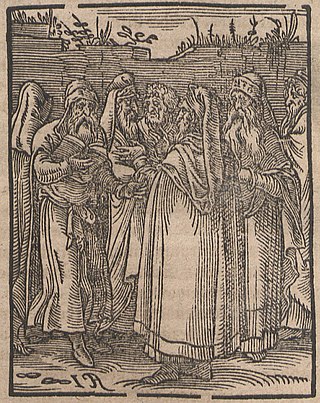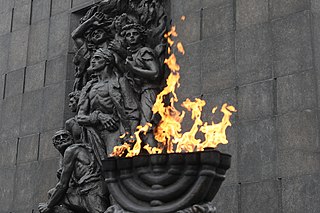Antisemitism is hostility to, prejudice towards, or discrimination against Jews. This sentiment is a form of racism, and a person who harbours it is called an antisemite. Primarily, antisemitic tendencies may be motivated by negative sentiment towards Jews as a people or by negative sentiment towards Jews with regard to Judaism. In the former case, usually presented as racial antisemitism, a person's hostility is driven by the belief that Jews constitute a distinct race with inherent traits or characteristics that are repulsive or inferior to the preferred traits or characteristics within that person's society. In the latter case, known as religious antisemitism, a person's hostility is driven by their religion's perception of Jews and Judaism, typically encompassing doctrines of supersession that expect or demand Jews to turn away from Judaism and submit to the religion presenting itself as Judaism's successor faith—this is a common theme within the other Abrahamic religions. The development of racial and religious antisemitism has historically been encouraged by the concept of anti-Judaism, which is distinct from antisemitism itself.

Judaism is an Abrahamic, monotheistic, and ethnic religion. It comprises the collective spiritual, cultural, and legal traditions of the Jewish people, having originated as an organized religion in the Middle East during the Bronze Age. Contemporary Judaism evolved from Yahwism, the cultic religious movement of ancient Israel and Judah, around the 6th/5th century BCE, and is thus considered to be one of the oldest monotheistic religions. Religious Jews regard Judaism as their means of observing the Mosaic covenant, which was established between God and the Israelites, their ancestors. Along with Samaritanism, to which it is closely related, Judaism is one of the two oldest Abrahamic religions.

Jerusalem is a city in West Asia, on a plateau in the Judaean Mountains between the Mediterranean and the Dead Sea. It is one of the oldest cities in the world, and is considered holy to the three major Abrahamic religions—Judaism, Christianity, and Islam. Both the State of Israel and Palestine claim Jerusalem as their capital. Israel maintains its primary governmental institutions there, and Palestine ultimately foresees it as its seat of power. Neither claim is widely recognized internationally.

Kabbalah or Qabalah is an esoteric method, discipline and school of thought in Jewish mysticism. A traditional Kabbalist is called a Mekubbal. The definition of Kabbalah varies according to the tradition and aims of those following it, from its origin in medieval Judaism to its later adaptations in Western esotericism. Jewish Kabbalah is a set of esoteric teachings meant to explain the relationship between the unchanging, eternal God—the mysterious Ein Sof —and the mortal, finite universe. It forms the foundation of mystical religious interpretations within Judaism.

Shabbat or the Sabbath, also called Shabbos by Ashkenazim, is the day of rest on the seventh day of the week—i.e., Saturday. On this day, religious Jews and Christians remember the biblical stories describing the creation of the heaven and earth in six days and the redemption from slavery and the Exodus from Egypt, and look forward to a future Messianic Age. Since the Jewish religious calendar counts days from sunset to sunset, Shabbat begins in the evening of what on the civil calendar is Friday. This has always been the sabbath day. Constantine, by edict, changed it to the first day of the week, Sunday, to honor the Sun God, SUNday.

Yiddish is a West Germanic language historically spoken by Ashkenazi Jews. It originates from 9th century Central Europe, providing the nascent Ashkenazi community with a vernacular based on High German fused with many elements taken from Hebrew and to some extent Aramaic. Most varieties of Yiddish include elements of Slavic languages and the vocabulary contains traces of Romance languages. Yiddish has traditionally been written using the Hebrew alphabet; however, there are variations, including the standardized YIVO orthography that employs the Latin alphabet.

Zionism is a nationalist movement that emerged in Europe in the 19th century to enable the establishment of a homeland for the Jewish people in Palestine, a region roughly corresponding to the Land of Israel in Jewish tradition. Following the establishment of the modern state of Israel, Zionism became an ideology that supports the development and protection of the State of Israel as a Jewish state.

Messianic Judaism is a modernist and syncretic sect that considers itself Jewish. Many consider it a part of the Christian movement of evangelicalism.

A pogrom is a violent riot incited with the aim of massacring or expelling an ethnic or religious group, particularly Jews. The term entered the English language from Russian to describe 19th- and 20th-century attacks on Jews in the Russian Empire. Similar attacks against Jews which also occurred at other times and places became known retrospectively as pogroms. Sometimes the word is used to describe publicly sanctioned purgative attacks against non-Jewish groups. The characteristics of a pogrom vary widely, depending on the specific incident, at times leading to, or culminating in, massacres.
In the 20th century, approximately 900000 Jews migrated, fled, or were expelled from Muslim-majority countries throughout Africa and Asia. Primarily a consequence of the 1948 Arab–Israeli War, the mass movement mainly transpired from 1948 to the early 1970s, with one final exodus of Iranian Jews occurring shortly after the Islamic Revolution in 1979–1980. An estimated 650000 (72%) of these Jews resettled in Israel.

Ashkenazi Jews, also known as Ashkenazic Jews or Ashkenazim, constitute a Jewish diaspora population that emerged in the Holy Roman Empire around the end of the first millennium CE. They traditionally spoke Yiddish and largely migrated towards northern and eastern Europe during the late Middle Ages due to persecution. Hebrew was primarily used as a literary and sacred language until its 20th-century revival as a common language in Israel.

SephardicJews, also known as Sephardi Jews or Sephardim, and rarely as Iberian Peninsular Jews, are a Jewish diaspora population associated with the Iberian Peninsula. The term, which is derived from the Hebrew Sepharad, can also refer to the Jews of the Middle East and North Africa, who were also heavily influenced by Sephardic law and customs. Many Iberian Jewish exiled families also later sought refuge in those Jewish communities, resulting in ethnic and cultural integration with those communities over the span of many centuries.

Jewish history is the history of the Jews, their nation, religion, and culture, as it developed and interacted with other peoples, religions, and cultures.

Aliyah is the immigration of Jews from the diaspora to, historically, the geographical Land of Israel or the Palestine region, which is today chiefly represented by the State of Israel. Traditionally described as "the act of going up", moving to the Land of Israel or "making aliyah" is one of the most basic tenets of Zionism. The opposite action — emigration by Jews from the Land of Israel — is referred to in the Hebrew language as yerida. The Law of Return that was passed by the Israeli parliament in 1950 gives all diaspora Jews, as well as their children and grandchildren, the right to relocate to Israel and acquire Israeli citizenship on the basis of connecting to their Jewish identity.

The Jewish diaspora or exile is the dispersion of Israelites or Jews out of their ancient ancestral homeland and their subsequent settlement in other parts of the globe.

The history of the Jews in Poland dates back at least 1,000 years. For centuries, Poland was home to the largest and most significant Ashkenazi Jewish community in the world. Poland was a principal center of Jewish culture, because of the long period of statutory religious tolerance and social autonomy which ended after the Partitions of Poland in the 18th century. During World War II there was a nearly complete genocidal destruction of the Polish Jewish community by Nazi Germany and its collaborators of various nationalities, during the German occupation of Poland between 1939 and 1945, called the Holocaust. Since the fall of communism in Poland, there has been a renewed interest in Jewish culture, featuring an annual Jewish Culture Festival, new study programs at Polish secondary schools and universities, and the opening of Warsaw's Museum of the History of Polish Jews.

American Jews or Jewish Americans are American citizens who are Jewish, whether by culture, ethnicity, or religion. According to a 2020 poll conducted by Pew Research, approximately two thirds of American Jews identify as Ashkenazi, 3% identify as Sephardic, and 1% identify as Mizrahi. An additional 6% identify as some combination of the three categories.
As of 2023, the world's core Jewish population was estimated at 15.7 million, which is approximately 0.2% of the 8 billion worldwide population. Israel hosts the largest core Jewish population in the world with 7.2 million, followed by the United States with 6.3 million. Other countries with core Jewish populations above 100,000 include France (440,000), Canada (398,000), the United Kingdom (312,000), Argentina (171,000), Russia (132,000), Germany (125,000), and Australia (117,200). The number of Jews worldwide rises to 18 million with the addition of the "connected" Jewish population, including those who say they are partly Jewish or that have Jewish backgrounds from at least one Jewish parent, and rises again to 21 million with the addition of the "enlarged" Jewish population, including those who say they have Jewish backgrounds but no Jewish parents and all non-Jewish household members who live with Jews. Counting all those who are eligible for Israeli citizenship under Israel's Law of Return, in addition to Israeli Jews, raised the total to 25.5 million.

The Jews or Jewish people are an ethnoreligious group and nation originating from the Israelites of the ancient Near East, and whose traditional religion is Judaism. Jewish ethnicity, religion, and community are highly interrelated, as Judaism is an ethnic religion, although not all ethnic Jews practice it. Despite this, religious Jews regard individuals who have formally converted to Judaism as part of the community.

Mandatory Palestine was a geopolitical entity that existed between 1920 and 1948 in the region of Palestine under the terms of the League of Nations Mandate for Palestine.
![]() This article incorporates text from a publication now in the public domain : Singer, Isidore; et al., eds. (1901–1906). "Astronomy". The Jewish Encyclopedia . New York: Funk & Wagnalls.
This article incorporates text from a publication now in the public domain : Singer, Isidore; et al., eds. (1901–1906). "Astronomy". The Jewish Encyclopedia . New York: Funk & Wagnalls.















